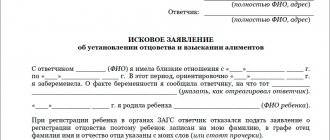Can parents in Russia apply for child support for their children?
The right of needy parents to receive child support benefits from their adult children is secured by a number of legislative acts. At the same time, assistance in their maintenance in case of need should be provided regardless of the level of well-being of the children: their difficult financial situation is not included in the list of grounds for refusing to grant benefits.
The legislative framework
Legal regulation of the issue of alimony assistance for this category of citizens is carried out by the Family Code of the Russian Federation (Chapter 15, Articles 87–88). The procedure for implementing alimony payments is declared in Chapters 16–17 of this document (Articles 99–115 of the RF IC).
If previously only retired parents could receive alimony from their children, then from March 2021 this right also applies to citizens of pre-retirement age. The corresponding regulatory amendment to Article 169 of the RF IC was adopted by the State Duma on March 12, 2021.
Articles on the topic (click to view)
- Assignment of the right to claim under alimony obligations is possible
- Formula for calculating penalties and fines for alimony: sample
- What are the consequences of non-payment of alimony in 2021?
- Payment of alimony voluntarily without agreement
- Criminal liability for non-payment of alimony under Art. 157 of the Criminal Code of the Russian Federation
- Is alimony from financial assistance withheld for vacation?
- Find out the debt by name from the bailiffs for alimony
In what cases do parents apply for child support benefits?
According to the provisions of Article 87 of the RF IC, the right to receive child support benefits is exercised in cases where:
- a pensioner parent, a person of pre-retirement age or a disabled person of groups I-II is included in the category of disabled citizens in need, including situations where a person needs expensive treatment or long-term rehabilitation;
- Before a son or daughter turns 18, the parent treats the issue of their financial support with the utmost responsibility.
Receiving alimony: procedural features
You can receive cash benefits as financial assistance by reaching agreements specified in a voluntary agreement between the parties, or by collecting it through the courts.
Voluntary agreement and mechanism for its execution
An agreement on the payment of alimony is the best way to resolve the issue of allocating funds in the form of alimony benefits for parents in need of financial assistance. A legally binding document is drawn up in writing and certified by a notary. It records:
- amount to be paid;
- frequency and timing of financial transfers;
- other conditions acceptable to both parties.
To conclude an agreement with a notary you will need:
- identification documents of the parties;
- a child’s birth certificate as proof of family ties.
In accordance with the rules for the implementation of payments by agreement of the parties, the frequency of contributions for the maintenance of the needy party may vary within the time frame previously agreed upon by them.
A sample voluntary agreement can be found here.
Claim for alimony recovery
The option of judicial review of the situation is applicable if there are any conflicts or disagreements in material matters. The basis for consideration is a lawsuit on behalf of the parent - a potential recipient of alimony assistance. A legal claim drawn up according to regulated rules must reflect:
- details of the judicial authority where the appeal is submitted;
- information about the plaintiff and defendant (full name, residence and registration address, contact details);
- a statement of the situation and a list of specific requirements for financial recovery;
- legal grounds for the court to satisfy this request.
The claim template can be found here.
What is the statement supported?
The list of documents that are submitted along with the claim includes originals and copies of:
- the plaintiff's general passport;
- child's birth certificate/adoption document;
- papers confirming the plaintiff’s need (medical reports, extracts, etc.);
- pensioner certificates;
- receipts for expenses for the purchase of medicines, utility bills, etc.
Where to send your appeal
The statement of claim is submitted to the office of the magistrate court at the place of residence (registration) of the plaintiff or defendant. Applications of this kind are not subject to state duty. Their consideration is given up to two months from the date of registration of the claim in the court office.
When alimony is collected, what should I do?
First of all, you need to contact the debtor’s employer. To do this, you will need to provide an application that must be accepted for execution. The document is drawn up in any form. A template can be provided by the accounting department, or specialists will help you compile it yourself.
For more details, see “Where to submit a court order.”
Alimony can be obtained in the following ways:
- To a bank account or card. This option is the most convenient and fastest. The money is received immediately and can be freely used for the needs of the children.
- Via postal transfer. This option is relevant for residents of small settlements where banking transactions are problematic.
- Through the organization's cash desk. To do this, the plaintiff will have to visit the debtor’s organization monthly and collect funds on the spot.
The amount of benefits that a parent can claim
A needy person can receive payments from children only in a fixed amount of money. The amount of the penalty is determined by a number of factors:
- the degree of need of the recipient (the size of his regular pension benefit, subsistence minimum, health status, presence/absence of disability, etc. are taken into account);
- the level of material well-being of the payer (the factor of employment, age, salary is taken into account);
- the presence of other persons dependent on the payer.
This is important to know: Alimony for remarriage after abandonment
At what debts can the process be started?
The amount of outstanding obligations should be from 50,000–500,000 (for a simplified scheme) or from 300,000 (if the option is through the court, but a number of other conditions apply, more on them below). This may include debts for:
- loans and borrowings taken (with interest);
- concluded agreements related to the guarantee;
- taxes and other types of fees;
- alimony;
- compensation for harm caused to the health of third parties.
When determining the final figure, current nuances such as the date of regular deposit of funds, the presence/absence of overdue payments, and claims from the second party are not taken into account.
The amount of payments for car fines can be checked on the official website of the State Traffic Safety Inspectorate, for taxes - on the Federal Tax Service portal, for open enforcement proceedings - on the FSSP web resource, or all at once - in the personal account of the State Services.
For what reasons is it legal to refuse to award alimony to parents?
According to the provisions of Article 87 of the RF IC, adult children can avoid alimony collection in cases where:
- the parent avoided the responsibility of supporting the child in every possible way in the past (this fact requires documentary evidence at trial);
- The plaintiff was at one time deprived of parental rights in relation to the child who is the defendant.
The parent retains the right to file for alimony even if he previously did not pay funds for the maintenance of his son or daughter due to the absence of claims for collection. The lawsuit must indicate that participation in the upbringing and financial support of the child was not recorded.
Thus, the recovery of financial resources for the maintenance of needy persons is applicable not only to parents of minor children. The law establishes a reverse obligation for adult children to provide financial support to their disabled parents. Payment of funds in the form of alimony is realized through a voluntary agreement or judicial collection.
Alimony – when is it paid?
The law treats free unions between spouses liberally, and therefore allows citizens to independently choose the type of relationship they have. Today, alimony can be written off forcibly:
- During marriage. For example, one of the parents decided to leave the family without terminating the relationship. In this case, his responsibilities include providing funds for the maintenance of the common child. To do this, it is necessary to draw up an agreement that reflects the main points for paying alimony.
- After divorce. In this case, the former spouses must resolve this issue through negotiations and draw up an agreement. If a common decision cannot be reached and one of the spouses refuses to provide payments, you can go to court.
- Outside of marriage. Most couples do not register their relationship, but have common minor children. The parent who does not live with the family must pay child support. In this case, paternity determination will be required.
In all other cases, for example, when the child is not registered with the father, but he does not deny his involvement in paternity, payment of alimony is possible only at the request of the parent. For forced collection, you will need to establish paternity and only then demand payment of child support.
In what cases can parents apply for child support?
Parents can file for child support due to moral and family ties. With age, the ability to work is lost, and the size of the pension may be insufficient to purchase medicines and special food.
Parents themselves or their representatives - for example, guardians - can turn to children for help in cases where the parents are declared incompetent and their own children refuse to take care of them and provide financial support. The alimony rights of parents with limited legal capacity can be protected by their trustees.
Basic conditions allowing parents to receive child support:
- disability;
- availability of parental rights during the minority of children;
- timely and appropriate child care in the past;
Retirement age is not considered a sufficient criterion for receiving alimony from adult children. In old age, the father or mother can continue to work, including in the judicial system, the maximum period of stay in which has been extended to 75 years.
To find out whether parents can apply for child support for their children, it is necessary to start from the criteria of a person’s ability to work. It presupposes the parent’s ability to earn their own living and provide for their needs without the help of an adult child.
The presence of a disability indicates a person’s inability to work. But if he continues to work under an employment contract or receives other sufficient income, then the court may refuse to award the required amount to the mother or father.
Questions for a lawyer
Question: My ex-wife became pregnant while she was married to me. I found out that she was cheating on me and promptly filed for divorce. With the consent of my wife, we were divorced. After the birth of the child, my wife pointed out that I was the father and said that she would file for child support. But we are divorced, and I am convinced that her son is from another man. Can she apply for alimony if the child is actually not mine and was born after the divorce?
Answer: Yes, it can. According to paragraph 2 of Art. 48 of the RF IC, if a child was born no later than 300 days from the date of divorce, the father is the former spouse, unless otherwise proven. To restore justice, it is necessary to file a lawsuit to challenge paternity. After the court's decision, the entry about the father will be excluded from the child's birth certificate. An important point: in court it is necessary to indicate that suspicions of paternity arose after the child was registered, since according to paragraph 2 of Art. 52 of the RF IC, if a parent knew that the child was not his, but gave consent to registration, paternity cannot be challenged.
Read more: Denial of paternity
Question: I'm trying to save up money to buy a car, so I control the expenditure of the family budget. My wife complains that I don’t give her enough money and threatens to file for alimony. Can she demand alimony if we are not divorced?
Answer: According to Art. 89 of the RF IC, you are obliged to financially support your spouse. A wife can oblige the payment of alimony under an agreement or a court decision only in 3 cases: in case of incapacity and need, in case of caring for a child under 3 years of age, in caring for a common disabled child. In other cases, the wife is not entitled to alimony. You did not indicate whether you have children together. If so, then the wife, being married, has the right to demand child support.
Read more: Child support in marriage without divorce
When deciding to issue alimony, it is necessary to take into account many factors: the payer’s place of residence, his readiness to accept responsibility, the financial situation of both parties, the presence of other dependents. Wrong steps can result in wasted time. If you find it difficult to choose a method for filing collections, or don’t know whether you have the legal right to file for alimony, get a free consultation with a lawyer from the website ros-nasledstvo.ru. Professional assistance will help speed up the process of collecting alimony.
FREE CONSULTATIONS are available for you! If you want to solve exactly your problem, then
:
- describe your situation to a lawyer in an online chat;
- write a question in the form below;
- call Moscow and Moscow region
- call St. Petersburg and region
Save or share the link on social networks
- FREE for a lawyer!
Write your question, our lawyer will prepare an answer for FREE and call you back in 5 minutes.
By submitting data you agree to the Consent to PD processing, PD Processing Policy and User Agreement
Useful information on the topic
2
Child support outside of marriage, in a civil marriage
From the point of view of legislation, a child must be provided for by his parents, outside of...
1
Alimony from old age pension, disability pension, military personnel, Ministry of Internal Affairs
Parents are obligated to support their children and each other regardless...
25
Statement of claim for collection of child support
According to Article 122 of the Code of Civil Procedure of the Russian Federation, to collect child support is not...
3
Denial of paternity
The main reason why the child's father wants to abandon him...
1
Termination of alimony payments
The Family Code of the Russian Federation provides for alimony payments to a needy spouse in…
2
Calculation of alimony debt
Statistically, every third potential payer does not pay alimony. Wherein…
Amount and procedure for collection
Parental support is kept in a fixed amount. Parents can apply for child support at any time when the need arises.
There are no clearly established amounts. A father or mother can apply for financial support regardless of the financial situation of the children, since the right to go to court is not limited by law.
If the issue is to be resolved in court, the court must take into account the following circumstances:
- health status, income of the plaintiff;
- state of health, financial situation of the defendants;
- whether the defendant has other dependents;
In what case can you apply for alimony - a situation that is decided taking into account the financial situation of the parent. The size of the pension and the parent’s ability to provide for their current and future needs for treatment and a normal life are taken into account. The court takes into account the financial situation of all children, regardless of which of them was presented with claims by the parent.
Requirements for enforcement proceedings
When discussing who can be declared bankrupt, it should be added that this person will be able to initiate the procedure in a simplified manner only if the following conditions are met:
- There are no assets that the authorities have the right to recover, that is, paragraph 4 of Article 46 of Federal Law No. 229 is fulfilled, and the process against the subject is completed.
- The document with the current decision of the competent authorities was returned to the claimant.
- No new case has been initiated on the same basis.
Today it is not difficult to check whether enforcement proceedings are open and why the previous ones were closed - to do this, just visit the State Services portal or the official website of the FSSP and find the information you need in the relevant sections.
Read Financial recovery in bankruptcy: what is it, purpose, types and maximum terms of the procedure
Procedural features
It is allowed to represent your interests in person or through a representative by proxy. The statement of claim is submitted to the magistrate at the place of permanent (actual) residence or at the place of residence of the defendant (Article 29 of the Code of Civil Procedure of the Russian Federation). For example, a mother can apply for child support for her son at her place of residence if traveling to the defendant’s area of residence is difficult for health reasons.
To prepare a case for trial, it is advisable to know the position of the defendant. You can apply for alimony for your son or daughter, later ending the case in court with a settlement agreement. In such a situation, the court issues a ruling on the approval of such a document and provides its full description.
If the defendant filed an objection to the claim and refuses to provide maintenance to a pensioner who finds himself in a difficult life situation, then the case is considered in detail at a court hearing.
Evidence base and documents
The following may be used as evidence:
- written documents;
- witness statements;
- explanations of the parties, verified by the court and established as reliable facts;
The following documents must be provided:
- certificates from medical institutions about the plaintiff’s health status;
- certificate of disability (if available), conclusion of a medical commission on incapacity for work;
- document on the status of a low-income family - issued by social protection authorities;
- certificates of income, family composition of the defendant, marriage certificate, birth certificates of children (grandchildren of the plaintiff);
To the question whether it is possible to submit documents in copies, the answer is positive. The original documents are presented to the court for review. You can submit original documents and then write an application for their return.
According to the court's determination, other children of the plaintiff may also be involved in the case on the defendant's side. The decision to include such persons in the judicial process remains at the discretion of the judge. You can independently apply for child support payments for all children at the same time, indicating them in the statement of claim as co-defendants.
This is important to know: The new law on alimony adopted on January 15, 2021
By order
This process is a simplified version of the case, as it is considered more efficient and faster. The procedure is carried out only if the parents have no disputes regarding the further maintenance of their children. as well as the fact of paternity in relation to the child.
How to apply for an order
An application for an order for alimony is drawn up according to the established template. It reflects basic information about the claimant and the debtor. In it the applicant must reflect:
- The exact name of the court and its address;
- Full name of yourself and the alimony payer;
- Information about the child, about the marriage, about the circumstances of the family breakdown;
- Information about the refusal of the other party to pay alimony;
- Justification for the amount of alimony;
- Basic requirements for the debtor.
The document is signed by the applicant and dated. The application must also include a list of attached documents. The date and signature of the claimant must be included.
For more information on the procedure for ordering the collection of alimony, see the material “Application for a court order.”
An approximate sample application is given below, but it is better to entrust the procedure for its preparation to a competent lawyer.
Jurisdiction
This procedure is carried out only by the magistrate's court. You can submit your application in person to the judge, or send it electronically with attached documents through the court’s website. However, electronic submission will require a qualified digital signature.
See more details on how to apply for alimony online.
Documentation
In case of collection of alimony by order, you will need to present along with the application:
- Certificate of family composition from both parents.
- Reflection of the payer's income in documentary form.
- Marriage certificates (if available).
- Information about the place of residence of both parents.
- A document reflecting the presence of other children who are being supported.
If the court considers the arguments presented in the application or their documentary evidence to be insufficient, then the order will be refused, and the applicant will be asked to file a lawsuit.
Characteristics of judicial practice
Before you find out how to apply for alimony, you should keep in mind that in the decision the court indicates a fixed amount of alimony. If parents were found to be obligated to provide financial support for several children, then the judge designates the share of each child in the maintenance of the father and (or) mother.
An analysis of judicial practice shows that most of the claims that parents bring to court are satisfied and alimony is awarded. The amounts may be small, taking into account the financial and family situation of the child (presence of children, etc.).
Adoptive parents can also receive alimony (in terms of their rights and responsibilities, they are equal to natural parents). His pupils may be required to pay alimony to a pensioner or disabled teacher. A stepfather and stepmother also have the right to receive payments if they have continuously taken care of their stepson or stepdaughter for 5 years. If the circumstances are proven, their claims will also be satisfied.
It must be remembered that the court will refuse child support to a parent who was once deprived of parental rights or did not properly care for the child. Practice shows that the only convincing argument in refusing to award alimony will be the established fact of deprivation of parental rights.
In other situations, the defendant’s arguments that the parent raised him poorly, in the past did not feed him well enough, kept him in poor conditions, gave him bad clothes (forced him to carry him to term, etc.) usually rarely serve as a convincing argument for the court. The court also satisfies the parents' demands for the need to bear additional (actual) expenses for their treatment, care, etc.
If arrears arise for alimony, you can submit a writ of execution to the bailiff and demand that proceedings be initiated. More than 50% cannot be withheld from the defendant's salary or other income. It is possible to demand payment of a penalty under Art. 115 RF IC. Its amount is 0.5% of the debt for each day of late payment.
It is possible to collect child support from an adult child. But it should be borne in mind that after a positive court decision, the relationship between parent and children may worsen. The court has no right to force them to communicate with an elderly and disabled person (come to visit, live with them, do laundry, cook for them, buy medicine, look for doctors, etc.). Such moral responsibility falls solely on the conscience of children.
Who can file for bankruptcy: requirements for individuals
In the standard case, the applicant must meet several general conditions:
Bankruptcy of individuals
from 5000 rub/month
Read more
Services of a credit lawyer
from 3000 rubles
Read more
Legal assistance to debtors
from 3000 rubles
more
Write-off of loan debts
from 5000 rub/month
More details
- Have a debt in the amount specified above - either 50-500 thousand, or from 300, depending on the scheme that he is going to use. Again, this amount may include credit, tax and other obligations already given as examples.
- Be 3 months or more late on regular payments.
- To prove his insolvency - provide certificates that fully inform about his official income (lack of work without a good reason is considered a minus), the presence of valuable property, major transactions made over the last 3 years, the state of accounts, family composition.
- A citizen of the Russian Federation has the right to start the process even when he has good reason to believe that in the near future he will not be able to fulfill his obligations. For example, in the case of serious illness, loss of ability to work and/or a stable source of income.
In what cases are parents entitled to child support?
Whether parents can file for child support is of interest to many fathers and mothers in need of financial assistance. In this regard, we propose to understand this issue, namely, the aspects related to who, to whom and in what cases is obliged to provide financial assistance of this kind. We will also talk about what articles of Russian legislation are worth paying attention to and what measures will be taken in the event of refusal to pay funds by individuals who are obliged to do so.
The legislative framework
The main guideline today is Federal Law No. 289, adopted on July 31, 2020. Why? Because it is he who determines the procedure for changes made to other Federal Laws and acts relating to issues of recognition of economic insolvency, and therefore is the most relevant regulator.
As you have already seen, both simplified and standard litigation have certain pitfalls, to successfully overcome which it is worth using the services of an experienced lawyer. You will find a good lawyer in – contact us, we will help you write off your debts. We are open to cooperation with companies: we will explain who can initiate bankruptcy proceedings for a legal entity, and if necessary, we will carry it out with maximum convenience for you.
Watch a video about this:
Can parents apply for child support for their children?
In family law there is such a term as alimony, which most individuals for some reason are accustomed to associate with material payments directed from a father who does not live with his family to minor children. However, not only the father, but also the mother, and even children may in some cases be required to pay alimony allowance, since the meaning of this type of payment is for able-bodied relatives to financially help relatives in need.
It should be noted that if a certain individual is the biological father or mother of a child, but has been officially deprived of parental rights, then, according to the current legislation, he has no right to demand the recovery of alimony from his son/daughter. Children are required to pay money only to those parents whose status is legally confirmed.
In what cases is the father/mother entitled to alimony?
The fact that children must also provide financial support to their parents in the form of alimony compensation does not mean that they are obliged to do this absolutely always. First of all, you need to take into account that benefits will be accrued to an individual from his child only if he has either reached retirement age or is classified as a disabled person of the first or second group. In addition, several more mandatory conditions must be met:
- Restrictions for children. First of all, the child acting as a potential payer must be an adult. In addition, he must be able to work. For example, if a mother has a son who is already eighteen years old, but he cannot work due to poor health, then it will not be possible to get him to pay child support.
- Requirement for parents. Parents will also not be able to simply demand alimony in order to improve their financial situation. Compensation payments by law are awarded only to those fathers/mothers who need additional funds to meet the most basic needs of life, and who, due to age or health, cannot earn it themselves.
- Relationship criterion. Also, in order to oblige one individual (for example, a daughter) to pay alimony compensation to another individual (for example, a father), their family ties must be confirmed. If a daughter lived her entire childhood with her stepfather, who is not her legal parent, then she is not obliged to pay him cash benefits.
This is important to know: Collection of alimony from individual entrepreneurs using a simplified procedure in 2021
In the event that an adult and able-bodied child has two parents who need to provide child support payments, one of whom is legal and the other biological, then the money will be recovered in this case only in favor of the legal father or mother.
The procedure for calculating cash benefits
In order to draw up a specific document, according to which the child will be obliged to pay money to his disabled parent, both individuals need to meet and discuss all the details of this procedure (size, frequency of payments, mutual responsibilities, etc.). If this can be done, then an appropriate agreement is drawn up. After this, based on a certain package of documents, the notary certifies it and the agreement is given legal force.
Otherwise, if children voluntarily do not want to allocate money for the maintenance of their parents, but the latter are absolutely sure that, according to all legal norms, this is the responsibility of the son/daughter, it is necessary to go to court.
The potential recipient of alimony will need to write a statement of claim, attach some documents to it and send it to the judicial authority for consideration. After this, a summons will be sent to the defendant, and both individuals will be invited to a court hearing, which will result in a decision regarding the provision of alimony.
If the husband does not pay alimony voluntarily, what should I do?
Refusal to pay alimony is a fairly common practice. In this case, you must adhere to the following actions:
- Find out the reason. Quite often, men refuse to make payments due to health, disability or lack of income. Therefore, you need to try to talk with your spouse - perhaps there is no intent in the fact that alimony does not come.
- If a spouse refuses on principle to pay amounts of money or pays them at a minimum, but at the same time has a stable income, in this case he will have to go to court.
- Often, after a court ruling, the husband also evades payments, accumulating alimony debt. The situation is especially aggravated if the spouse’s income is difficult to track. To do this, you need to contact the bailiffs. They will help establish the source of income, identify his bank accounts and describe his property.
If the ex-spouse is not aggressive and understands his obligation to pay child support, you can try to reach an amicable agreement. Otherwise, you need to go to court and the sooner the better. In some cases, it will be possible to collect alimony retroactively for the past period.
Amount of child support compensation for a parent
This type of alimony payments has a distinctive feature, unlike other types of compensation. While child support from parents for children can be provided in various forms (shares of wages, through property rights, etc.), payments from an adult child to the father/mother should only be in the form of a lump sum of money. Benefits must be transferred by the payer at least once a month.
As for the amount of child support for needy parents, Article 87 of the Family Code of the Russian Federation notes the following points:
- Who sets the amount of compensation? Neither the child obligated to pay child support nor the parent acting as the needy recipient has the right to determine the amount of payments. The only body that has such powers is the court. Only if the amount is established by the judicial authorities will it be recognized as objectively assigned and satisfying the interests of both parties.
- How is the size determined? Before assigning a particular amount for payment, the court takes into account a number of valid reasons that relate not only to the plaintiff, but also to the defendant. The financial and family situations of individuals, their health indicators, as well as any other important circumstances are taken into account.
- What if there are several children? It may also be that the parent in need of financial support has not one adult and able-bodied child, but, for example, three. In such a situation, regardless of which of the children the application for alimony was filed against, the court will still force all children to pay benefits equally.











